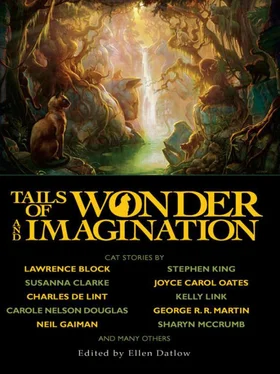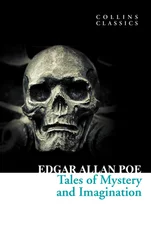Ellen Datlow - Tails of Wonder and Imagination
Здесь есть возможность читать онлайн «Ellen Datlow - Tails of Wonder and Imagination» весь текст электронной книги совершенно бесплатно (целиком полную версию без сокращений). В некоторых случаях можно слушать аудио, скачать через торрент в формате fb2 и присутствует краткое содержание. Год выпуска: 2010, ISBN: 2010, Издательство: Night Shade Books, Жанр: Фэнтези, Фантастика и фэнтези, Ужасы и Мистика, на английском языке. Описание произведения, (предисловие) а так же отзывы посетителей доступны на портале библиотеки ЛибКат.
- Название:Tails of Wonder and Imagination
- Автор:
- Издательство:Night Shade Books
- Жанр:
- Год:2010
- ISBN:978-1-59780-170-6
- Рейтинг книги:5 / 5. Голосов: 1
-
Избранное:Добавить в избранное
- Отзывы:
-
Ваша оценка:
- 100
- 1
- 2
- 3
- 4
- 5
Tails of Wonder and Imagination: краткое содержание, описание и аннотация
Предлагаем к чтению аннотацию, описание, краткое содержание или предисловие (зависит от того, что написал сам автор книги «Tails of Wonder and Imagination»). Если вы не нашли необходимую информацию о книге — напишите в комментариях, мы постараемся отыскать её.
collects the best of the last thirty years of science fiction and fantasy stories about cats from an all-star list of contributors.
Tails of Wonder and Imagination — читать онлайн бесплатно полную книгу (весь текст) целиком
Ниже представлен текст книги, разбитый по страницам. Система сохранения места последней прочитанной страницы, позволяет с удобством читать онлайн бесплатно книгу «Tails of Wonder and Imagination», без необходимости каждый раз заново искать на чём Вы остановились. Поставьте закладку, и сможете в любой момент перейти на страницу, на которой закончили чтение.
Интервал:
Закладка:
“I suppose I might accept this cruel and unethical decision, and take it as one of life’s hard lessons. Very well then. So be it.” He stroked Dax. “It has been said that those who do not learn from history are doomed to repeat it. I can only blame myself for this wretched turn of events. Why, it was only a few scant months past that I chanced to view a historical drama on this very sort of situation. It was about a seedship such as my own that rid one small world of an annoying pest, only to have the ungrateful planetary government refuse payment. Had I been wiser, that would have taught me to demand my payment in advance.” He sighed. “But I was not wise, and now I must suffer.” Tuf stroked Dax again, and paused. “Perhaps your Council of Guardians might be interested in viewing this particular tape, purely for recreational purposes. It is holographic, fully dramatized, and well-acted, and moreover, it gives a fascinating insight into the workings and capabilities of a ship such as this one. Highly educational. The title is Seedship of Hamelin.”
They paid him, of course.
LIFE REGARDED AS A JIGSAW PUZZLE OF HIGHLY LUSTROUS CATS
Michael Bishop
Michael Bishop has been publishing stories, novels, poetry, and criticism for forty years (starting at age two). His novel No Enemy but Time won the Nebula Award, Unicorn Mountain won the Mythopoeic Fantasy Award, and Brittle Innings won the Locus Award for Best Fantasy Novel. He has published seven volumes of short fiction, and his stories have won the Nebula, two Southeastern Science Fiction Association short-fiction awards, and, most recently, the Shirley Jackson Award for Best Short Story (“The Pile,” based on notes left behind by his late son, Jamie). His most recent book, this time as editor, is the anthology A Cross of Centuries: Twenty-Five Imaginative Tales about the Christ, and his most recent story is a Lovecraftian science-fiction tale, “The City Quiet as Death,” written with Steven Utley and published at Tor.com.
Bishop says that he “borrowed” one image in the story from Annie Dillard’s Pilgrim at Tinker Creek , a passage in which she describes a cat of hers—walking across her bed and unclothed body, leaving rose-like red paw prints behind as a result of having earlier stalked through wet red clay.
Your father-in-law, who insists that you call him Howie, even though you prefer Mr. Bragg, likes jigsaw puzzles. If they prove harder than he has the skill or the patience for, he knows a sneaky way around the problem.
During the third Christmas season after your marriage to Marti, you find Howie at a card table wearing a parka, a blue watch cap with a crown of burgundy leather, and fur-lined shoes. (December through February, it is freezing in the Braggs’ Tudor-style house outside Spartanburg.) He is assembling a huge jigsaw puzzle, for the Braggs give him one every Christmas. His challenge is to put it together, unaided by drop-in company or any other family member, before the Sugar Bowl kick-off on New Year’s Day.
This year, the puzzle is of cats.
The ESB procedure being administered to you by the Zoo Cop and his associates is keyed to cats. When they zap your implanted electrodes, cat-related memories parachute into your mind’s eye, opening out like fireworks.
The lid from the puzzle’s box is Mr. Bragg’s—Howie’s—blueprint, and it depicts a population explosion of stylized cats. They are both mysterious beasts and whimsical cartoons. The puzzle lacks any background, it’s so full of cats. They run, stalk, lap milk, tussel, tongue-file their fur, snooze, etc., etc. There are no puzzle areas where a single color dominates, a serious obstacle to quick assembly.
Howie has a solution. When only a handful of pieces remain in the box, he uses a razor blade to shave any piece that refuses to fit where he wants it to. This is cheating, as even Howie readily acknowledges, but on New Year’s Eve, with Dick Clark standing in Times Square and the Sugar Bowl game only hours away, a man can’t afford to screw around.
“Looking good,” you say as the crowd on TV starts its rowdy countdown to midnight. “You’re almost there.”
Howie confesses—complains?—that this puzzle has been a “real mindbender.” He appreciates the challenge of a thousand-plus pieces and a crazy-making dearth of internal clues, but why this particular puzzle? He usually receives a photographic landscape or a Western painting by Remington.
“I’m not a cat fancier,” he tells you. “Most of ’em’re sneaky little bastards, don’t you think?”
Marti likes cats, but when you get canned at Piedmont Freight in Atlanta, she moves back to Spartanburg with your son, Jacob, who may be allergic to cats. Marti leaves in your keeping two calico mongrels that duck out of sight whenever you try to feed or catch them. You catch them eventually, of course, and drive them to the pound in a plastic animal carrier that Marti bought from Delta, or Eastern, or some other airline out at Hartsfield.
Penfield, a.k.a. the Zoo Cop, wants to know how you lost your job. He gives you a multiple-choice quiz:
A. Companywide lay-off
B. Neglect of duty and/or unacceptable job performance
C. Personality conflict with a supervisor
D. Suspicion of disloyalty
E. All, or none, of the above
You tell him that there was an incident of (alleged) sexual harassment involving a female secretary whose name, even under the impetus of electrical stimulation of the brain (ESB), you cannot now recall. All you can recall is every cat, real or imaginary, ever to etch its image into your consciousness.
After your firing, you take the cats, Springer and Ossie (short for Ocelot), to the pound. When you look back from the shelter’s doorway, a teen-age attendant is giving you, no doubt about it, the evil eye. Springer and Ossie are doomed. No one in the big, busy city wants a mixed-breed female. The fate awaiting nine-year-old Jacob’s cats—never mind their complicity in his frightening asthma—is the gas chamber, but, today, you are as indifferent to the cats’ fate as a latter-day Eichmann. You are numb from the molecular level upward.
“We did have them spayed,” you defend yourself. “Couldn’t you use that to pitch them to some nice family?”
You begin to laugh.
Is this another instance of Inappropriate Affect? Except for the laughing gas given to you to sink the electrodes, you’ve now been off all medication for… you don’t know how long.
On the street only three years after your dismissal, you wept at hoboes’ bawdy jokes, got up and danced if the obituaries you’d been sleeping under reported an old friend’s death.
Once, you giggled when a black girl bummed a cigarette in the parking lot of Trinity United Methodist: “I got AIDS, man. Hain’t no smoke gonna kill me. Hain’t time enough for the old lung cee to kick in, too.”
Now that Penfield’s taken you off antipsychotics, is Ye Olde Inappropriate Affect kicking in again? Or is this fallout from the ESB? After all, one gets entirely different responses (rage and affection; fear and bravado) from zapping hypothalamic points less than 0.02 inches from each other.
Spill it, Adolf, Penfield says. What’s so funny?
Cat juggling, you tell him. (Your name has never been Adolf.)
What?
Steve Martin in The Jerk. An illegal Mexican sport. A joke, you know. Cat juggling.
You surrender to jerky laughter. It hurts, but your glee isn’t inappropriate. The movie was a comedy. People were supposed to laugh. Forget that when you close your eyes, you see yourself as the outlaw juggler. Forget that the cats in their caterwauling orbits include Springer, Ossie, Thai Thai, Romeo, and an anonymous albino kitten from your dead grandparents’ grain crib on their farm outside Montgomery….
Читать дальшеИнтервал:
Закладка:
Похожие книги на «Tails of Wonder and Imagination»
Представляем Вашему вниманию похожие книги на «Tails of Wonder and Imagination» списком для выбора. Мы отобрали схожую по названию и смыслу литературу в надежде предоставить читателям больше вариантов отыскать новые, интересные, ещё непрочитанные произведения.
Обсуждение, отзывы о книге «Tails of Wonder and Imagination» и просто собственные мнения читателей. Оставьте ваши комментарии, напишите, что Вы думаете о произведении, его смысле или главных героях. Укажите что конкретно понравилось, а что нет, и почему Вы так считаете.












